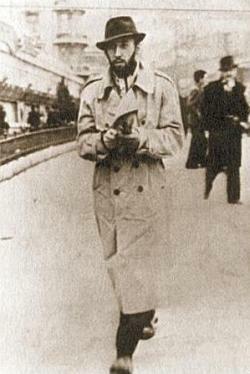
A RARE SHOT OF ORHAN VELI WITH HIS BEARD
Orhan Veli is one of Turkey's most loved poets, and a damn fine one in my own opinion, too. His poems are brisk and simple. He is a genius at creating startlingly fresh images out of ordinary things. Take this poem for example:
I buy old junk
And make it into stars
Music is food for the soul
I'm crazy for music.
I write poems.
I write poems and buy old junk
I sell the old junk and buy music
If I were a fish, swimming in a bottle of whiskey
Eskiler aliyorum
Alip yildiz yapiyorum
Musiki ruhun gidasidir
Musikiye bayiliyorum
Siir yaziyorum
Siir yazip eskiler aliyorum
Eskiler verip Musikiler aliyorum.
Bir de raki sisesinde balik olsam
I love that bit about "I buy old junk." Four short words (2 in Turkish), a very simple line about garbage turned magic with "And make it into stars." But take a gander at that last line, one of the most famous in Turkey. "If I were a fish in a bottle of whiskey." Veli, before he became well-known, was obsessed with getting read. And he gave all sorts of interviews in which he explained, for example, that this line was an exaggeration of the narrator's poverty, that a poor man, wanting food and shelter would naturally crave whiskey (Turkish raki) as well, fantasizing in this desperate manner about swimming inside the bottle. A friend asked him after he was established and stopped writing such obscure lines, "Is that really what you meant by the fish thing? That stuff about the guy and poverty?" "Of course not," Veli answered. "But it made people read me, didn't it?" He had put in this line merely to attract attention. (And it did. Every magazine and newspaper had a field day making fun of the fish in a bottle and gave Veli more publicity than he had ever dreamed of.) "I would have put this nonsense in other poems, too, if I had known how much noise it would make," he said. He even shaved his beard for publicity--this, at a time in Turkish history when no young man in his right mind shaved.
TECHNICAL STUFF TECHNICAL STUFF TECHNICAL STUFF!!!!!!!!
A bit about the translation. (This might fall into my Dad's favorite category: absolutely unimportant but nice to know) Translation is a funny thing. You're always making decisions...include this even though it doesn't make sense in English? Add a word or two to make it read more smoothly? Change the sentence structure so it doesn't sound so awkward? Blah blah blah. One of the English translations I found said this for the first two lines of Veli's poem, "I find old clothes and cut them into stars." I think this is even better than the original in terms of a solid, yet magical image. In fact, I like it better than mine, but that's the thing. It's not very accurate. And I think I owe Veli some accuracy even if this is only my private blog that no one else sees but me. Eskiler means "old stuff", junk in other words, not just clothes. The narrator of the poem is an "eskici", one of the poor men who wheel around an old cart through the streets and collect junk to fix and sell...a bit like a garage sale on wheels. You might see their cart loaded with broken dolls, radios, paintings, old textbooks, rabbit cages, pipes, and/or laundry baskets. They call out into the streets "eskiiiiiiiiiiiiiiiiiiiiiiiiiiiiiiiiiiiiiiiici!" so that folks know they're coming. And if they guy has a nice voice, it can be a very musical sound and as eerie as the ezan when that long "i" echoes. Supposedly these guys have been at it for centuries. And this brings up a last point. The verb almak means, "take, get, buy." The eskici doesn't buy anything. He just collects crap free off the street. In the poem, he almak's the junk and then almak's the music. In one case taking and in the other buying. But I think a repetition of the word "buy" sounds better in English rather than making that distinction clear--even though it deemphasizes his poverty, which is part of the poem's theme (he's at least able to buy junk in the poem, though that's not the case in real life.)
No comments:
Post a Comment